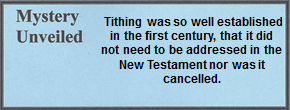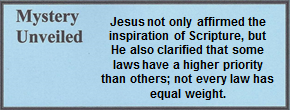13.05.03 Mt. 23:16-24
LEGALISTIC RELIGIOUS ATTITUDE CONDEMNED
16 “Woe to you, blind guides, who say, ‘Whoever takes an oath by the sanctuary, it means nothing. But whoever takes an oath by the gold of the sanctuary is bound by his oath.’ 17 Blind fools! For which is greater, the gold or the sanctuary that sanctified the gold? 18 Also, ‘Whoever takes an oath by the altar, it means nothing. But whoever takes an oath by the gift that is on it is bound by his oath.’ 19 Blind people! For which is greater, the gift or the altar that sanctifies the gift? 20 Therefore, the one who takes an oath by the altar takes an oath by it and by everything on it. 21 The one who takes an oath by the sanctuary takes an oath by it and by Him who dwells in it. 22 And the one who takes an oath by heaven takes an oath by God’s throne and by Him who sits on it.
23 “Woe to you, scribes and Pharisees, hypocrites! You pay a tenth of mint, dill, and cumin, yet you have neglected the more important matters of the law — justice, mercy, and faith. These things should have been done without neglecting the others. 24 Blind guides! You strain out a gnat, yet gulp down a camel!
“You pay a tenth of mint, dill, and cumin.” The religious leaders tithed on everything according to the Mosaic Law. If a man desired to reach the pinnacle of the Pharisee hierarchy, he had to take two vows:
- Maintain and promote strict ritual purification,[3] called the vow of Chabher (a/k/a Chabber; observing the Levitical Law).[4] It was said that if any agricultural products were not tithed, the food was not fit to eat.[5]
Yet if there was any way they could have avoided paying tithes, they did so immediately. The concept of giving a minimum of ten percent to the temple was a religious and cultural standard. It was not even questioned and, therefore, is not addressed in the New Testament. There was no need to address a nonexistent issue.
The early church continued the practice of tithing and it became a key doctrine. Critics, who claim that tithing ceased with the Old Testament era, fail to understand the cultural and religious setting of the day. Furthermore, were tithing to have been a doctrine only of the past, then Jesus would have condemned the continued practice of it just as He did other issues of the scribes and Pharisees. Clearly, this was not anything He desired to change.[6]
The first century church continued the practice of paying tithes. But instead of tithing at the temple, these gifts were to be given in the local synagogue or to the poor. Note the following, where the pastor was known as the “prophet.”
So when you take any first fruits of what is produced by the winepress and the threshing floor, by cows and by sheep, you shall give the first fruits to the prophets, for they are your high priests.
If, however, you have no prophet (pastor), give them to the poor. If you prepare dough, take the first fruits and give them according to the commandment.
Likewise, when you open a jar of wine or oil, take the first fruits and give them to the prophets. Take the first fruits of money and clothing and whatever (else) you own as you think best and give them according to the commandment.
Didache 13:3-7[7]
Jesus confronted the Pharisees, not because they paid tithes, but because they had hearts of stone (see 02.01.14). He never rescinded the law of tithing and the practice was continued according to the Old Testament directives.

“You have neglected the more important matters of the law.” Jesus clearly affirmed that while Scripture is inspired, some laws have a higher priority than others (cf. Mt. 23:23-24; 22:38-39). He never said that every law has equal weight to every other law, and therefore, there are different degrees of punishment in the eternal lake of fire.[8]

In the phrase, “You strain out a gnat,” Jesus made an allusion to the process of making wine. Insects were always attracted to the sweet aroma of fruit juice and wine. Eventually these unwanted bugs got into the beverage and needed to be removed. The Mishnah recorded that when straining the pulp from the wine with the use of a cloth or fine wicker basket, insects were attracted to the sweet wine. Great care was taken to keep the beverage pure by straining the gnats out as recorded in Shabbath 20:2 of the Mishnah. This phrase “you strain out a gnat,” was not just a figure of speech, but an allusion to properly preparing a beverage that would be ceremonially clean since a gnat was an unclean insect. Jesus used this imagery to describe the judgmental attitudes of the Pharisees. According to Him, they were concerned about keeping the impure gnats out, but were swallowing impure camels. Jesus used a common phrase as expressed in the Jerusalem Talmud:
“He that kills a flea on the Sabbath is as guilty as if he killed a camel.”
Jerusalem Talmud, Sabbath 107[9]
[1]. Josephus spoke of corrupt priests who stole the tithes from other priests in Antiquities, 20.9.2, found herein in, “A den of robbers,” 13.02.02. He also mentioned it in Antiquities 20.8.8 as found herein in “The chief priests” in 15.02.09. See additional rules on tithing in the Mishnah, Ma’aserot 1.1 and Moed Shabbath 4.7. The point is that tithing was a well-established practice.
[2]. Edersheim, The Life and Times of Jesus the Messiah. 216.
[3]. For additional details, see 02.01.14.Q1.
[4]. Edersheim, The Life and Times of Jesus the Messiah. 215-17.
[5]. Charry, By the Renewing of Your Minds. 62.
[6]. For additional references on the doctrine of tithing, see Gen. 14:20, 28:22; Lev. 27:30; 2 Ch. 31:5; Mal. 3:8-10; Mt. 23:23; Lk. 11:42; Heb. 7:6-8.
[7]. Clarification in parenthesis mine. The Didache is a book on church order that was written within a century of the life of Jesus. For more information, see 02.02.08.
[8]. See also Mt. 10:15 in 10.01.05.
[9]. For additional Sabbath regulations, see Jubilees 50:6-13 at 02.04.06. In fact, during the early days of the Maccabean Revolt, since the Jews refused to fight on the Sabbath, the Greeks slaughtered more than a thousand men, women, and children. Thereafter they decided to defend themselves so as not to be removed from the face of the earth (1 Macc. 2:31-38).